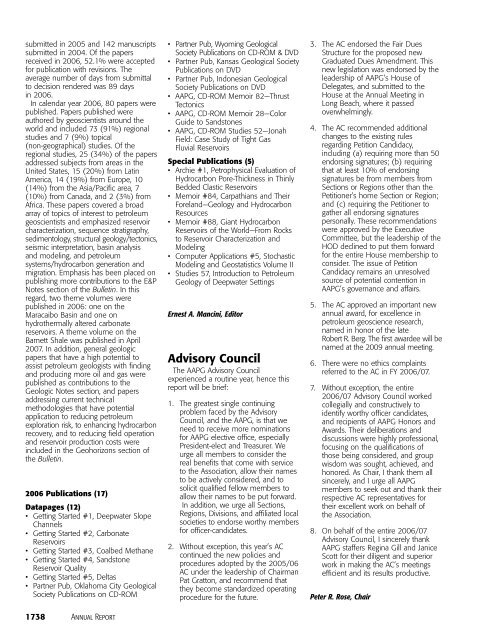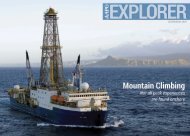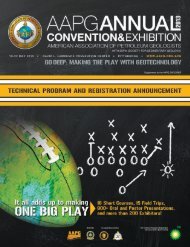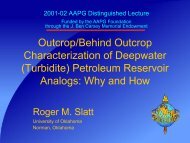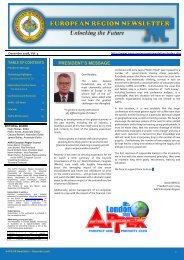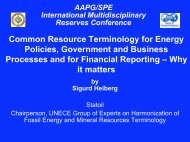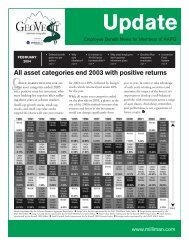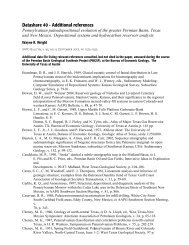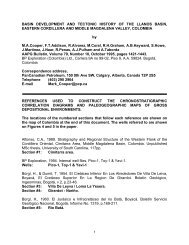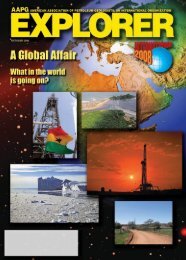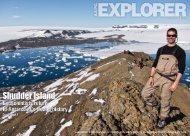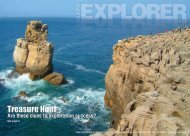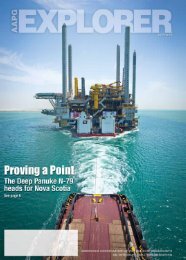2009 Annual Report - American Association of Petroleum Geologists
2009 Annual Report - American Association of Petroleum Geologists
2009 Annual Report - American Association of Petroleum Geologists
You also want an ePaper? Increase the reach of your titles
YUMPU automatically turns print PDFs into web optimized ePapers that Google loves.
submitted in 2005 and 142 manuscripts<br />
submitted in 2004. Of the papers<br />
received in 2006, 52.1% were accepted<br />
for publication with revisions. The<br />
average number <strong>of</strong> days from submittal<br />
to decision rendered was 89 days<br />
in 2006.<br />
In calendar year 2006, 80 papers were<br />
published. Papers published were<br />
authored by geoscientists around the<br />
world and included 73 (91%) regional<br />
studies and 7 (9%) topical<br />
(non-geographical) studies. Of the<br />
regional studies, 25 (34%) <strong>of</strong> the papers<br />
addressed subjects from areas in the<br />
United States, 15 (20%) from Latin<br />
America, 14 (19%) from Europe, 10<br />
(14%) from the Asia/Pacific area, 7<br />
(10%) from Canada, and 2 (3%) from<br />
Africa. These papers covered a broad<br />
array <strong>of</strong> topics <strong>of</strong> interest to petroleum<br />
geoscientists and emphasized reservoir<br />
characterization, sequence stratigraphy,<br />
sedimentology, structural geology/tectonics,<br />
seismic interpretation, basin analysis<br />
and modeling, and petroleum<br />
systems/hydrocarbon generation and<br />
migration. Emphasis has been placed on<br />
publishing more contributions to the E&P<br />
Notes section <strong>of</strong> the Bulletin. In this<br />
regard, two theme volumes were<br />
published in 2006: one on the<br />
Maracaibo Basin and one on<br />
hydrothermally altered carbonate<br />
reservoirs. A theme volume on the<br />
Barnett Shale was published in April<br />
2007. In addition, general geologic<br />
papers that have a high potential to<br />
assist petroleum geologists with finding<br />
and producing more oil and gas were<br />
published as contributions to the<br />
Geologic Notes section, and papers<br />
addressing current technical<br />
methodologies that have potential<br />
application to reducing petroleum<br />
exploration risk, to enhancing hydrocarbon<br />
recovery, and to reducing field operation<br />
and reservoir production costs were<br />
included in the Geohorizons section <strong>of</strong><br />
the Bulletin.<br />
2006 Publications (17)<br />
Datapages (12)<br />
• Getting Started #1, Deepwater Slope<br />
Channels<br />
• Getting Started #2, Carbonate<br />
Reservoirs<br />
• Getting Started #3, Coalbed Methane<br />
• Getting Started #4, Sandstone<br />
Reservoir Quality<br />
• Getting Started #5, Deltas<br />
• Partner Pub, Oklahoma City Geological<br />
Society Publications on CD-ROM<br />
1738 <strong>Annual</strong> <strong>Report</strong><br />
• Partner Pub, Wyoming Geological<br />
Society Publications on CD-ROM & DVD<br />
• Partner Pub, Kansas Geological Society<br />
Publications on DVD<br />
• Partner Pub, Indonesian Geological<br />
Society Publications on DVD<br />
• AAPG, CD-ROM Memoir 82—Thrust<br />
Tectonics<br />
• AAPG, CD-ROM Memoir 28—Color<br />
Guide to Sandstones<br />
• AAPG, CD-ROM Studies 52—Jonah<br />
Field: Case Study <strong>of</strong> Tight Gas<br />
Fluvial Reservoirs<br />
Special Publications (5)<br />
• Archie #1, Petrophysical Evaluation <strong>of</strong><br />
Hydrocarbon Pore-Thickness in Thinly<br />
Bedded Clastic Reservoirs<br />
• Memoir #84, Carpathians and Their<br />
Foreland—Geology and Hydrocarbon<br />
Resources<br />
• Memoir #88, Giant Hydrocarbon<br />
Reservoirs <strong>of</strong> the World—From Rocks<br />
to Reservoir Characterization and<br />
Modeling<br />
• Computer Applications #5, Stochastic<br />
Modeling and Geostatistics Volume II<br />
• Studies 57, Introduction to <strong>Petroleum</strong><br />
Geology <strong>of</strong> Deepwater Settings<br />
Ernest A. Mancini, Editor<br />
Advisory Council<br />
The AAPG Advisory Council<br />
experienced a routine year, hence this<br />
report will be brief:<br />
1. The greatest single continuing<br />
problem faced by the Advisory<br />
Council, and the AAPG, is that we<br />
need to receive more nominations<br />
for AAPG elective <strong>of</strong>fice, especially<br />
President-elect and Treasurer. We<br />
urge all members to consider the<br />
real benefits that come with service<br />
to the <strong>Association</strong>, allow their names<br />
to be actively considered, and to<br />
solicit qualified fellow members to<br />
allow their names to be put forward.<br />
In addition, we urge all Sections,<br />
Regions, Divisions, and affiliated local<br />
societies to endorse worthy members<br />
for <strong>of</strong>ficer-candidates.<br />
2. Without exception, this year’s AC<br />
continued the new policies and<br />
procedures adopted by the 2005/06<br />
AC under the leadership <strong>of</strong> Chairman<br />
Pat Gratton, and recommend that<br />
they become standardized operating<br />
procedure for the future.<br />
3. The AC endorsed the Fair Dues<br />
Structure for the proposed new<br />
Graduated Dues Amendment. This<br />
new legislation was endorsed by the<br />
leadership <strong>of</strong> AAPG’s House <strong>of</strong><br />
Delegates, and submitted to the<br />
House at the <strong>Annual</strong> Meeting in<br />
Long Beach, where it passed<br />
overwhelmingly.<br />
4. The AC recommended additional<br />
changes to the existing rules<br />
regarding Petition Candidacy,<br />
including (a) requiring more than 50<br />
endorsing signatures; (b) requiring<br />
that at least 10% <strong>of</strong> endorsing<br />
signatures be from members from<br />
Sections or Regions other than the<br />
Petitioner’s home Section or Region;<br />
and (c) requiring the Petitioner to<br />
gather all endorsing signatures<br />
personally. These recommendations<br />
were approved by the Executive<br />
Committee, but the leadership <strong>of</strong> the<br />
HOD declined to put them forward<br />
for the entire House membership to<br />
consider. The issue <strong>of</strong> Petition<br />
Candidacy remains an unresolved<br />
source <strong>of</strong> potential contention in<br />
AAPG’s governance and affairs.<br />
5. The AC approved an important new<br />
annual award, for excellence in<br />
petroleum geoscience research,<br />
named in honor <strong>of</strong> the late<br />
Robert R. Berg. The first awardee will be<br />
named at the <strong>2009</strong> annual meeting.<br />
6. There were no ethics complaints<br />
referred to the AC in FY 2006/07.<br />
7. Without exception, the entire<br />
2006/07 Advisory Council worked<br />
collegially and constructively to<br />
identify worthy <strong>of</strong>ficer candidates,<br />
and recipients <strong>of</strong> AAPG Honors and<br />
Awards. Their deliberations and<br />
discussions were highly pr<strong>of</strong>essional,<br />
focusing on the qualifications <strong>of</strong><br />
those being considered, and group<br />
wisdom was sought, achieved, and<br />
honored. As Chair, I thank them all<br />
sincerely, and I urge all AAPG<br />
members to seek out and thank their<br />
respective AC representatives for<br />
their excellent work on behalf <strong>of</strong><br />
the <strong>Association</strong>.<br />
8. On behalf <strong>of</strong> the entire 2006/07<br />
Advisory Council, I sincerely thank<br />
AAPG staffers Regina Gill and Janice<br />
Scott for their diligent and superior<br />
work in making the AC’s meetings<br />
efficient and its results productive.<br />
Peter R. Rose, Chair


